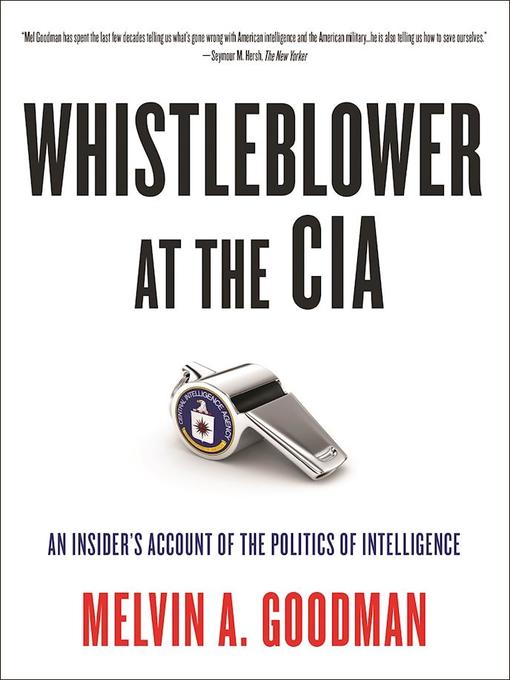
Whistleblower at the CIA
An Insider's Account of the Politics of Intelligence
کتاب های مرتبط
- اطلاعات
- نقد و بررسی
- دیدگاه کاربران
نقد و بررسی

January 23, 2017
Goodman (National Insecurity), a former CIA analyst who served from the Johnson administration through the first Reagan administration, exposes the disconcerting politicization of intelligence at America’s best-known international intelligence-gathering agency. The poisonous mixing of politics and ideology in service of White House masters culminates in Goodman’s account of his fateful but unsuccessful takedown attempt of his onetime friend Robert Gates, who became CIA director in 1991 after a failed 1987 attempt. Goodman boldly stepped out of shadows and into the harsh glare of a congressional hearing to charge Gates with downplaying his knowledge of the Iran-Contra Affair and manipulating intelligence facts to serve political ends. Recalling these events, Goodman harnesses palpable outrage to this solid, if sometimes repetitive, indictment of Gates as a relentless careerist who “lacked a moral core.” He also excoriates the news media, the courts, and Congress for failing to protect constitutional democracy or even other whistle-blowers such as Edward Snowden. As Goodman ominously concludes, this ongoing abdication of oversight and commitment to the truth by the keepers of the country’s secrets presages a slow but steady drift into the very authoritarianism against which the U.S. has long railed.

December 15, 2016
A former CIA analyst (1966-1990) deplores what he argues is the increasing deleterious politicization of the agency. In his latest book, Goodman--who has taught at the National War College, held other intelligence-related positions, and written earlier accounts of what he sees as a very troubled agency (Failure of Intelligence: The Decline and Fall of the CIA, 2008, etc.)--thoroughly rages against the corruption he has viewed in the highest ranks of the CIA. There are themes and incidents that he strikes repeatedly like clamorous gongs: President Harry Truman's original vision of the CIA, the author's 1991 appearance before a Congressional committee to oppose the appointment of Robert Gates as Director of the CIA, the defense of Edward Snowden, and the failures of the mainstream media to pay attention to the politicization of the agency. Goodman takes shots at pretty much everyone (save himself and his wife, who also served in the agency), including all the presidents since Truman, the media, and virtually all the CIA directors (save the ones in charge when he began in the 1960s). He continually administers severe hammer strokes to President George W. Bush and his team for the Iraq War and for the false/distorted intelligence they used to whip up public support. But the bone he simply cannot release bears the face of Gates. Repeatedly, he tells us that he and Gates were once friends and then follows with accounts of one egregious Gates deed/maneuver/lie after another. (Unfortunately, he repeats them often, sometimes with similar diction.) The author also savages Gates' memoirs and returns constantly to the 1991 Congressional testimony. Over and over, we hear about Gates' rise in the agency, which Goodman attributes to callous, unethical manipulations. The author does provide some useful inside information about other notable cases--Iran-Contra, Aldrich Ames, and the Patriot Act. The causes of Goodman's vitriol are indeed worrisome, but his countless repetitions grow wearisome.
COPYRIGHT(2016) Kirkus Reviews, ALL RIGHTS RESERVED.

January 1, 2017
Make no mistake: national security is of the utmost importance, which is why Goodman's valiant expose of the politicization of the nation's intelligence-gathering operation is a brave and courageous endeavor. By its very nature, he observes, the CIA is a warren of subterfuge and deception, a haven for those who revel in wielding power shielded from scrutiny by the public, the press, and the rest of the government. An analyst and division chief, Goodman's career began in the mid-1960s, when the country was fighting both the war in Vietnam and the Cold War with the Soviets. He worked until 1990, when he resigned in frustration and outrage over his experience with widespread corruption, internal harassment, and intentional dissemination of misinformation to presidents, Congress, and the American public. Goodman's honest evaluation, supported by cogent analysis, lays bare the raw ambition, venal duplicity, and deplorable incompetence of some of those charged with keeping the nation safe. At a time when the very concepts of truth and accuracy are being called into question, Goodman's revelations are a clarion call for vigilance and accountability.(Reprinted with permission of Booklist, copyright 2017, American Library Association.)

























دیدگاه کاربران